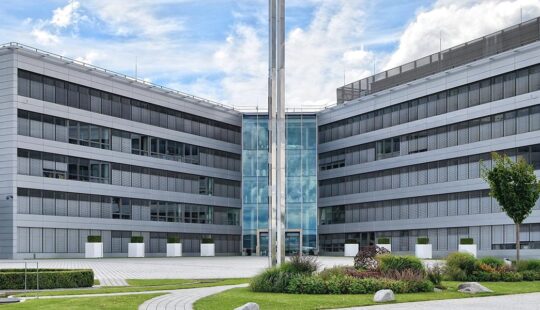SAP Global Mindfulness Practice is bringing its successful formula to customers around the world, helping them build their own mindfulness communities through training courses and consulting services.
At first, Peter Bostelmann, chief mindfulness officer at SAP, thought he had misheard when Siemens, a long-standing SAP customer, asked whether he could provide mindfulness courses for its employees back in 2016. “I felt a slight cognitive dissonance,” Bostelmann recalls. “You want us to teach you mindfulness? And then I realized that, back then, we had already built up over five years of expertise establishing mindfulness practices in a global organization.”
It wasn’t long before the appeal of the Search Inside Yourself (SIY) program, launched at SAP in 2013, spread beyond the company’s boundaries and customers started to see SAP in a new light: as a pioneer of corporate mindfulness. The enterprise resource planning (ERP) expert was now offering training courses and consulting services to help customers introduce mindfulness practices into their own organizations. Since then, SAP’s mindfulness trainers have held more than 100 SIY training courses for customers. What’s more, SAP Global Mindfulness Practice, as part of the Future of Work team at SAP, has helped over 20 large enterprises train their own SIY instructors and build internal mindfulness communities.
Evidence-Based Program
One of these enterprises is SLB, a global technology company driving energy innovation, with more than 100,000 employees. Marie-Isabelle Fleuri, Corporate Health and Well-Being manager at SLB, was entirely convinced of the benefits of working with SAP Global Mindfulness Practice after attending an SIY course.
“With its strong focus on leadership and neuroscience, the SIY approach rests on compelling scientific evidence,” she says. “From experience working in technology companies for 20 years, I knew that if I wanted to bring the topic of mindfulness to SLB successfully, it had to resonate with the culture. And I knew SAP because we use its ERP system. Implementing it involved a massive change management process that impacted the entire company before it was eventually seen as a good thing. That’s the SAP effect.”
Fleuri was keen to make SIY a pillar of SLB’s well-being offering, but initially couldn’t secure the budget she needed to run a pilot training course. Thanks to the existing relationship between the two companies, though, she was eventually able to arrange sponsorship for SLB’s first program.
That initial investment has long since paid off. Although SLB now has 13 SIY trainers of its own, it still asks for SAP trainers to help meet the strong demand from its employees for training. At least 19 on-site courses are due to take place with SAP Global Mindfulness Practice this year. The SAP program also provides advice on many aspects of embedding mindfulness in the company culture over the long term. That’s vital support, says Fleuri: “If we had to create all the necessary content and processes ourselves, it would have been an impossible task in such a short period of time. The support from SAP Global Mindfulness Practice gave us the strength to have such an impact. We’ve trained more than 900 people at SLB in two years and implemented mindfulness practices around the world. I see our cooperation with SAP as a shining example of the power of mindfulness, of how collaboration can work across two organizations, and of our capacity to support each other – to be empathetic and passionate.”
The cooperation between SLB and SAP was sincere, open, and deeply trusting from the start, says Bostelmann. “Our key message is not, ‘We’ve got a product, and we’ll sell it to you.’ It’s about how we can help translate the knowledge we’ve gained so that it resonates in a different company culture. I can sense the same desire at SLB to truly bring about lasting change in the company culture. That’s what makes working together such fun,” he says.
Reflecting SLB’s purpose to “create amazing technology that unlocks access to energy for the benefit of all,” its training course on mindfulness and emotional intelligence is entitled “Unlock Your Power” (UYP).
“By cultivating better emotional intelligence in our people, we are proactively defining and evolving our culture at SLB toward healthier and happier employees and shaping the work environment to allow us to thrive. Working together with SAP and what we are learning through the Unlock Your Power program is central to this process of evolution.”
Dr. Jonathan O’Keefe, SLB global medical advisor
Beginner’s Mind
Working with mindfulness customers is a continuous learning experience for everyone involved. SAP’s mindfulness experts are fascinated, for example, by the way Fleuri has seamlessly integrated mindfulness into the health organization and the smart way she is marketing the activities.
“On the one hand, we learn from our customers; on the other, we develop best practices and materials for them that we can then also use ourselves. Teach-the-teacher courses for customers have honed our understanding of the kind of person required to drive a company’s cultural transformation forward,” says Bostelmann.
As Fleuri explains, the feedback course participants give is very encouraging: “The first day, they are generally rather reserved, as they are unsure what to expect. On the second day, they’re glad they signed up. And toward the end of the second day, they don’t want to leave! It’s moving to see them engaging with each other like old friends.”
Ambitious Goals
Fleuri presented SLB’s mindfulness story at the Mindful Leader Summit in Washington, D.C., in November 2022, four years after she first heard Bostelmann giving a speech there on SAP Global Mindfulness Practice. Things really have come full circle, but her mission at SLB is by no means complete. She is currently growing the trainers pool to reach the core of the organization, especially the field. This requires trainings in more than 10 different languages as well as mobile and flexible engagement with the operations teams.
“The opportunity is to embed our mindfulness program into the company culture,” she says. “It’s about empowering people to prioritize their health and well-being, to be at their best for themselves but also for the organization. We see this principle already anchored in our cooperation with the SAP team. We’re all looking for ways to improve an organization’s performance by fostering psychological safety – to encourage creativity, innovation, and sustainability. I believe that mindfulness and emotional intelligence programs will help us achieve this goal and, ultimately, humanize the organization.”
“UYP is an excellent and very relevant initiative, superbly conducted and executed. What I liked most is the non-prescriptive nature…providing a toolbox from which to pick and choose techniques based on the individual, environment, and situation. This will go a long way in improving motivation and productivity. No wonder that the sessions are selling out! My expectations were clearly surpassed, and I highly recommend this for all levels of the organization.”
Arijit Paul, HSE director practices, SLB
Mindfulness Is Making Waves
Bostelmann sees great opportunities in future customer cooperations: “Customers like SLB from the oil and gas industry, but also from health, consumer goods, and insurance are pioneers in their sectors that, with our help, have implemented mindfulness. Although they are very different from IT firms, they were able to introduce the SAP model into their company culture successfully. I find this particularly gratifying. We can envisage addressing other industries in the future to create new ‘lighthouses.’”
In the 10th anniversary year of the SAP Global Mindfulness Practice program, Bostelmann and his team plan to deepen their customer relationships. The aim is to create a network in which companies can support and inspire each other. With this in mind, he attended the Mindful Leader Summit in September.
“Mindfulness is a societal trend that’s being reflected in the workplace,” he says. “People sense the need for it. Mindfulness practice allows them to protect their mental resilience as they navigate their increasingly volatile lives.”



